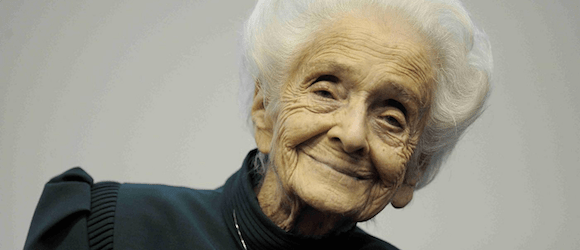Yesterday, at the age of 103, Rita Levi-Montalcini died the longest lived Nobel Prize Winner in history, the tenth woman to be elected to the U.S. National Academy of Sciences, the co-discoverer of nerve growth factor, and a woman who refused to let her father’s ideas about gender or a state’s ideas about race keep her from doing some pretty great science.
Levi-Montalcini was born the youngest (along with her twin sister) child of an Italian-Jewish family in 1909. She entered university at the age of twenty, because that was how long it took her to convince her father that one of his daughters could seek an education that would prepare her for things other than marriage and motherhood. But after that hurdle was cleared, she filled the gaps in her education, graduated from high school, and started classes in less than a year, graduating summa cum laude, becoming the lab assistant to Guiseppe Levi, a pioneer in the study of in vitro cells.
Two years later, however, Mussolini’s Manifesto of Race was published, preparing Italy for the enactment of a number of laws stripping anyone not of “Ayran” descent of their Italian citizenship, and proscribing them from holding many professions, including governmental positions. Levi-Montalcini was forced to leave her position at the University of Turin, but she refused to leave her research. She set up a tiny laboratory in her small bedroom at home, studying the growth of chicken embryos, and continued her research after her family was forced to flee to the countryside due to bombing, and even after being forced underground to escape the Nazi invasion of Italy. After the Allied liberation, she worked as a doctor in a refugee camp.
Post-war, she was invited to continue her work in America at Washington University in St. Louis, which is where she performed her Nobel Prizewinning work isolating nerve growth factor (NGF), the mechanism whereby organisms tell cells to grow and die, with lots of applications in cancer research, neurodegenerative diseases, and embryos. Indeed, Levi-Montalcini attributed her continued mental acuity into old age to daily eyedrops of NGF.
Her work will have scientists thinking long after her death, no thanks to her superlatively (among the population of Nobel Prize Winners, at least) long life.
(via Wired.)








Published: Dec 31, 2012 11:43 am